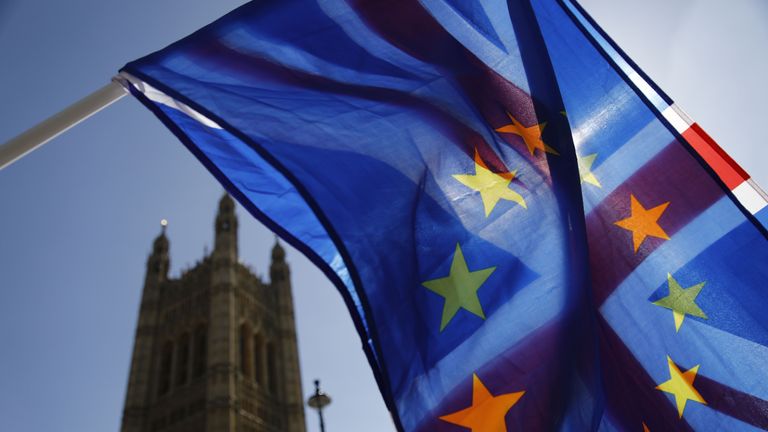Brexit: EU taking legal action over PM's controversial Internal Market Bill - but does it matter?
Brussels claims Boris Johnson is breaching the "good faith" both sides signed up to in the withdrawal agreement.
Saturday 3 October 2020 18:18, UK
The fact that the European Commission is starting legal proceedings against the British government certainly sounds impressive - but is聽this really a decisive moment - or just a bit of theatre?
On the one hand, this sort of legal move - known as an infringement procedure - is relatively routine.
British government sources were quick to point out that, in 2019, there were around 800 infringement cases in play involving the 27 member states of the European Union.
This is the 94th such action that has been opened against the United Kingdom since it joined the EU, and many of them are still unresolved.
But the flip side is that plenty of these are about very particular things - trade disputes, or interpretations of a select piece of EU law.
The procedure initiated today against the UK is different. Why so?
Well it involves an allegation that has caused so much anger that it has done a remarkable job of uniting Europe's politicians, almost regardless of their politics or geography.
The accusation is breaching trust, by threatening the Withdrawal Agreement.
That agreement has an almost sacred place in the heart of European politics. It took years to agree and involved negotiations with every member state.
The idea that it can now be rewritten is seen as fanciful. But the concept of it being ignored is considered offensive by many here. You don't have to take my word for it.
This afternoon, an extremely senior EU diplomat, closely involved in these talks, sent me a message expressing quiet fury about the effect of the Internal Market Bill.
They said: "The Withdrawal Agreement is a treaty, grounded in international law and the mere fact of this infringement, and the statement of intent in this bill, will be negative for the reputation of the UK as a trusted international partner.
"Yes, infringements are common within the EU. Every member state racks them up, but this one is of a different order", they continued.
It revolves entirely around the idea of "good faith", which is written there in Articles 4 and 5, right at the start of the Agreement.
It compels parties to "refrain from any measures which could jeopardise the attainment of the objectives of this Agreement".
According to the EU, that is exactly what the Internal Market Bill does. So there is widespread anger. But not everywhere.
The Dutch Prime Minister, Mark Rutte, described the legal action as a matter of procedure; little more than an act of administration. A nuisance rather than a calamity.
And for all the acrimony that has been expressed, you might argue that this is a tough negotiation and bruised feelings and legal threats are part and parcel of the joust.
Does that matter? Could it, in fact, bash some heads together and force progress?
From Brussels, it is quite hard to see how it has actually helped push negotiations forward. But equally, away from the political rows, it does not seem to have hindered the actual trade talks.
Lord Frost and Michel Barnier have kept meeting, so have their teams. There are whispers of progress about fishing rights and state aid, the two notable sticking points.
Instead, the spectre of legal action should probably best be seen as a mass of smoke symbols.
In Westminster, the government can say it is enacting protective legislation and will not be cowed by the European Union.
In Brussels, politicians can say they are united in standing up for the Withdrawal Agreement. Both messages suit the respective leaders.
What will push progress on trade talks is the clock. The shared assumption that a deal needs to have been agreed by the end of the month. That, rather than the threat of legal action, is what diplomats talk to me about.
:: Subscribe to the All Out Politics podcast on , , ,
Today, I asked a senior diplomat from a major EU country, to assess the likelihood of a deal.
"Impossible to call," came the reply.
"It's 50-50."
The threat of legal action gives us an insight into the fractious state of talks, but if a deal is completed by the end of this year, then these infringement proceedings will quickly be forgotten as a side show to a much bigger story.







